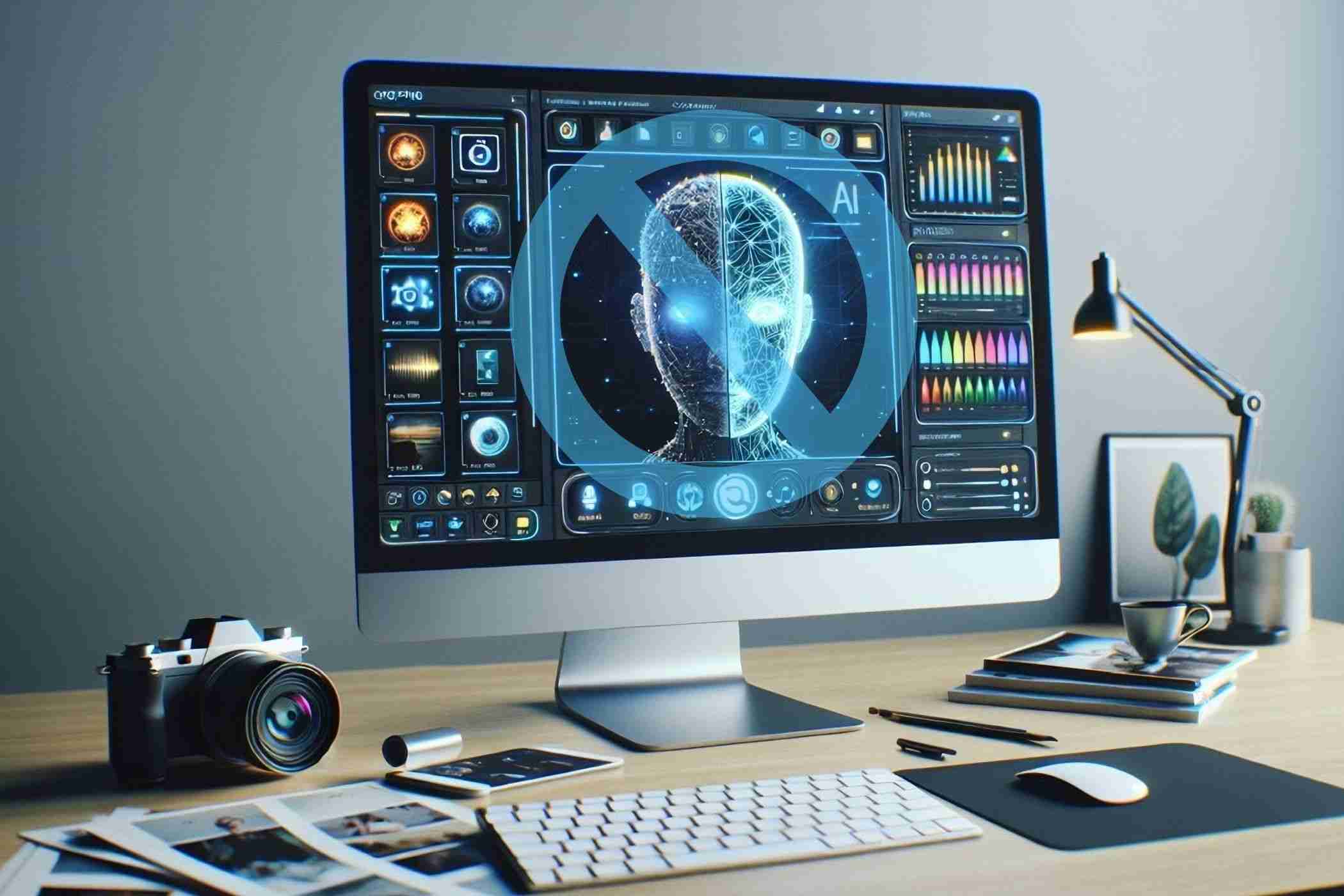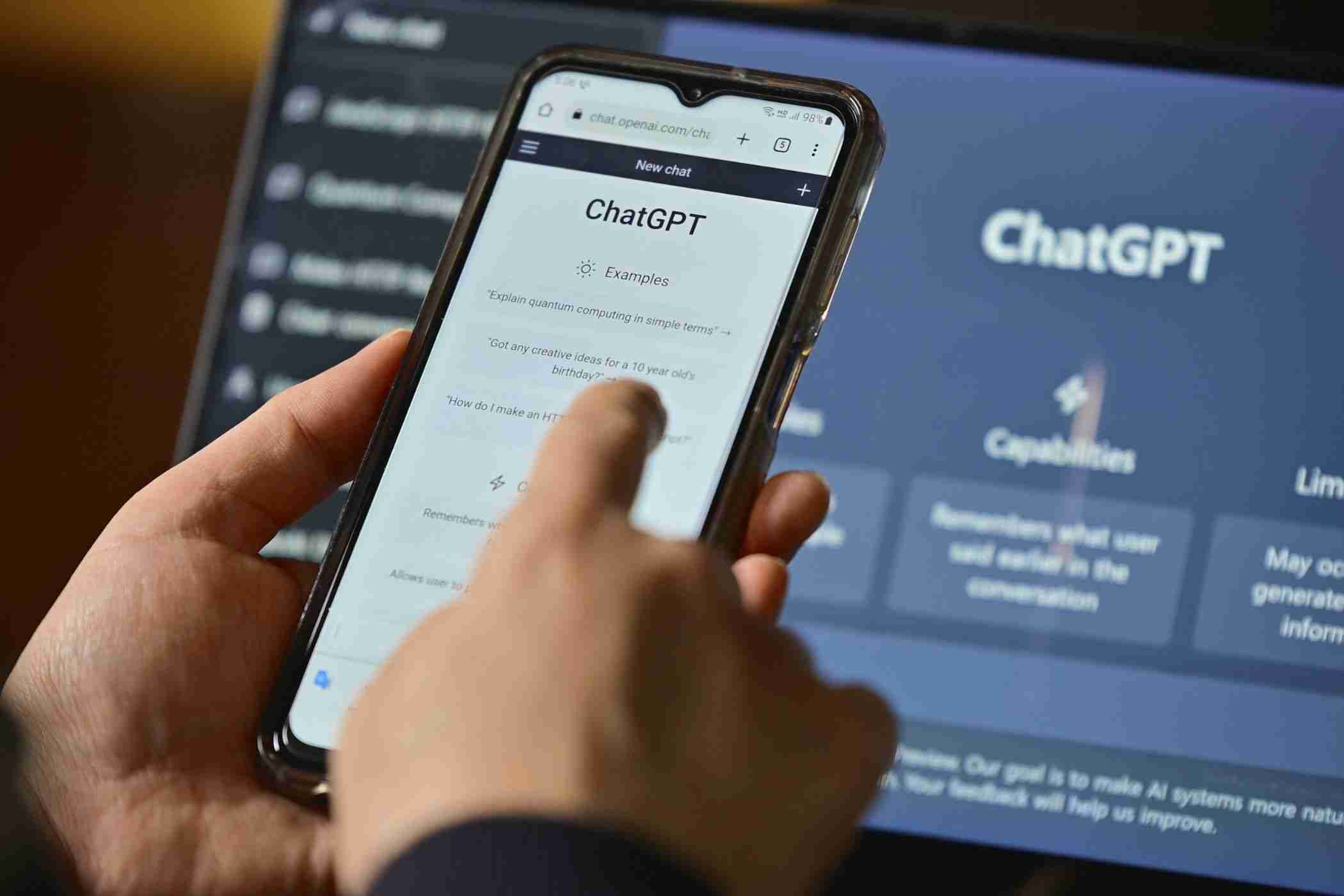These 7 Signs Show We\'ve Already Reached Peak AI
Wherever you look online, there are sites, services, and apps proclaiming their use of AI makes it the best option. I don't know about you, but it's constant presence has become tiring.
So, while AI is certainly here to stay in our everyday lives, several signs suggest that we've already reached peak AI hype.
1 Limited Interest From the General Public

While AI has received much attention in tech circles, it's important to remember that we live within a bubble in our niche groups. Just because we find something cool and game-changing doesn't mean that normal people will. In my opinion, AI is very much one of the topics that fall within this category.
When I speak to ordinary people about AI, they know about ChatGPT but not much else. Most of the time, people who are really interested in AI features already have a previous interest in tech. This is the exact same reason why I think Mastodon won't replace X (Twitter); it doesn't have mass appeal.
In addition to not being interested, many people are still skeptical of AI. For example, according to November 2023 research by Pew, 52% of US participants said they were more concerned than excited about AI (up from 37% in 2021). Moreover, only 10% said they were more excited than concerned (down from 18% in 2021).
2 Most AI Tools Aren't That Good
I've received heaps of messages from people telling me to try out their AI tools over the past two years. And I'll just be totally honest with you right now: the overwhelming majority of those messages end up in my trash folder. There are some amazing AI tools out there (e.g. ChatGPT and Grammarly), but the simple truth is that most AI tools are not very good.

A significant number of new AI tools that I've seen don't offer anything different from what's already out there. I believe that this is for multiple reasons. Firstly, many AI tools released since 2022 have been rushed onto the market. I can understand this, and I do believe in having a minimum viable product. But if it doesn't work, then it frankly doesn't work—no matter how many buzzwords you add to your product page.
Many AI tools have also been neglected of updates, resulting in them naturally worsening. Once again, I reiterate my number one business rule: Make something good people want and not just whatever is trendy.
3 Many AI Integrations Are Effectively Gimmicks
In addition to the several new AI apps and programs that aren't very good, many established brands have also rushed to create AI-powered features. Again, I completely understand this from a business perspective, but I don't see how adding lots of tools for the sake of it improves your product (and I think a lot of other people currently feel the same way).
I've written a comprehensive article about how every piece of creative software now has AI, but few actually need it. However, other industries have fallen into the same trap. While automation and some corrective tools are fantastic additions, I question the necessity of sky replacement features. They're good for fun, I guess, but they absolutely aren't needed.
The last thing anyone wants is clunky interfaces with lots of stuff that means nothing, and I do believe that many companies will realize this. Once the AI hype dies down a bit, I think that many businesses will start to be more selective with what they add.
4 "AI-Powered" Doesn't Carry the Same Weight That it Used To
For most of 2023 and the first part of 2024, I noticed a lot of businesses using "AI-powered" wherever they could. However, I don't think this term carries the same weight that it used to.

The reason is quite simple. Most people don't care about what the product they're using is powered by. They care that it does the job it promises. Naturally, AI will occasionally form part of this equation (e.g., summarizing meeting notes), but it sometimes won't.
I would definitely argue that the term has more weight in B2B settings, but not so much when talking about consumers. Some folks might even be worried about too much AI in video games and other things that they use.
5 People Have AI Fatigue
More people being concerned about AI is one thing, but I think that many people are also just tired of hearing about it. Ever since late 2022, a lot of tech-related news that has gone mainstream has related to AI. Over time, that will naturally wear some people down—even if they have an interest in tech.
People are just fatigued by the amount of information they're bombarded with daily. Our brains weren't supposed to process everything that goes on in the world, and even enough news on one topic can be exhausting.
In the same way that people have grown tired of hearing about other big topics in the past, I think we're also going to see many more individuals grow tired of hearing about AI all the time. Many people are definitely fed up seeing AI art, at the very least. All of this is a pretty clear sign that we're past peak AI (at least in terms of hype).
6 People Are Realizing That AI Is a Tool Rather Than a Replacement
When the AI craze started, everyone talked about how these tools were an all-in-one solution to replace anything and everything. But as time has progressed, more people have realized that using AI effectively is much more difficult than it looks.
Generative AI is one very good example of this. Prompting is more difficult than you might think, and even creating images with AI can cause headaches. AI prompting is a skill in and of itself, and many people won't be willing to put in the time to perfect it.

I also think that you really should have some skill in the thing you're doing before incorporating AI. For example, I've spoken to friends of mine in music who can tell very quickly when a song is AI-generated. Similarly, as a photographer, I know when a picture has been made with AI. You should use AI to complement what you're already doing if you want to get the most out of it rather than trying to replace it altogether.
7 No New Real AI Models
Another sign that we've reached peak AI is the lack of new AI models. I'm not talking about Gemini and GPT-5; I'm speaking about other potential alternatives.
Many of the biggest tech companies started developing their AI models around the launch of ChatGPT. Since then, though, things have been much quieter. Apple Intelligence is perhaps one exception. Nonetheless, the fact that things are quieter suggests that we might be past peak AI.
AI is a fantastic tool when used correctly, but the initial hype from late 2022 onward looks like it's on a downward curve. Many people are experiencing AI fatigue, and if they aren't yet, you can expect them to in the future. Moreover, most AI tools simply aren't good enough to make a dent. While AI will remain present in our lives, we'll start looking at it more rationally now that its novelty is wearing off.
-
 Indian AI Moment: Competition with China and the United States in Generative AIIndia's AI Ambitions: A 2025 Update With China and the US heavily investing in Generative AI, India is accelerating its own GenAI initiatives. Th...AI Posted on 2025-04-13
Indian AI Moment: Competition with China and the United States in Generative AIIndia's AI Ambitions: A 2025 Update With China and the US heavily investing in Generative AI, India is accelerating its own GenAI initiatives. Th...AI Posted on 2025-04-13 -
 Automating import of CSV to PostgreSQL using Airflow and DockerThis tutorial demonstrates building a robust data pipeline using Apache Airflow, Docker, and PostgreSQL to automate data transfer from CSV files to a ...AI Posted on 2025-04-12
Automating import of CSV to PostgreSQL using Airflow and DockerThis tutorial demonstrates building a robust data pipeline using Apache Airflow, Docker, and PostgreSQL to automate data transfer from CSV files to a ...AI Posted on 2025-04-12 -
 Swarm Intelligence Algorithms: Three Python ImplementationsImagine watching a flock of birds in flight. There's no leader, no one giving directions, yet they swoop and glide together in perfect harmony. It may...AI Posted on 2025-03-24
Swarm Intelligence Algorithms: Three Python ImplementationsImagine watching a flock of birds in flight. There's no leader, no one giving directions, yet they swoop and glide together in perfect harmony. It may...AI Posted on 2025-03-24 -
 How to Make Your LLM More Accurate with RAG & Fine-TuningImagine studying a module at university for a semester. At the end, after an intensive learning phase, you take an exam – and you can recall th...AI Posted on 2025-03-24
How to Make Your LLM More Accurate with RAG & Fine-TuningImagine studying a module at university for a semester. At the end, after an intensive learning phase, you take an exam – and you can recall th...AI Posted on 2025-03-24 -
 What is Google Gemini? Everything You Need To Know About Google’s ChatGPT RivalGoogle recently released its new Generative AI model, Gemini. It results from a collaborative effort by a range of teams at Google, including members ...AI Posted on 2025-03-23
What is Google Gemini? Everything You Need To Know About Google’s ChatGPT RivalGoogle recently released its new Generative AI model, Gemini. It results from a collaborative effort by a range of teams at Google, including members ...AI Posted on 2025-03-23 -
 Guide on Prompting with DSPyDSPy: A Declarative Framework for Building and Improving LLM Applications DSPy (Declarative Self-improving Language Programs) revolutionizes LLM appli...AI Posted on 2025-03-22
Guide on Prompting with DSPyDSPy: A Declarative Framework for Building and Improving LLM Applications DSPy (Declarative Self-improving Language Programs) revolutionizes LLM appli...AI Posted on 2025-03-22 -
 Automate Blog To Twitter ThreadThis article details automating the conversion of long-form content (like blog posts) into engaging Twitter threads using Google's Gemini-2.0 LLM,...AI Posted on 2025-03-11
Automate Blog To Twitter ThreadThis article details automating the conversion of long-form content (like blog posts) into engaging Twitter threads using Google's Gemini-2.0 LLM,...AI Posted on 2025-03-11 -
 Artificial Immune System (AIS): A Guide With Python ExamplesThis article explores artificial immune systems (AIS), computational models inspired by the human immune system's remarkable ability to identify a...AI Posted on 2025-03-04
Artificial Immune System (AIS): A Guide With Python ExamplesThis article explores artificial immune systems (AIS), computational models inspired by the human immune system's remarkable ability to identify a...AI Posted on 2025-03-04 -
 Try Asking ChatGPT These Fun Questions About YourselfEver wondered what ChatGPT knows about you? How it processes the information you've fed it over time? I've used ChatGPT heaps in different sce...AI Published on 2024-11-22
Try Asking ChatGPT These Fun Questions About YourselfEver wondered what ChatGPT knows about you? How it processes the information you've fed it over time? I've used ChatGPT heaps in different sce...AI Published on 2024-11-22 -
 Here\'s How You Can Still Try the Mysterious GPT-2 ChatbotIf you're into AI models or chatbots, you might have seen discussions about the mysterious GPT-2 chatbot and its effectiveness.Here, we explain wh...AI Published on 2024-11-08
Here\'s How You Can Still Try the Mysterious GPT-2 ChatbotIf you're into AI models or chatbots, you might have seen discussions about the mysterious GPT-2 chatbot and its effectiveness.Here, we explain wh...AI Published on 2024-11-08 -
 ChatGPT’s Canvas Mode Is Great: These Are 4 Ways to Use ItChatGPT's new Canvas mode has added an extra dimension to writing and editing in the world's leading generative AI tool. I've been using C...AI Published on 2024-11-08
ChatGPT’s Canvas Mode Is Great: These Are 4 Ways to Use ItChatGPT's new Canvas mode has added an extra dimension to writing and editing in the world's leading generative AI tool. I've been using C...AI Published on 2024-11-08 -
 How ChatGPT\'s Custom GPTs Could Expose Your Data and How to Keep It SafeChatGPT's custom GPT feature allows anyone to create a custom AI tool for almost anything you can think of; creative, technical, gaming, custom G...AI Published on 2024-11-08
How ChatGPT\'s Custom GPTs Could Expose Your Data and How to Keep It SafeChatGPT's custom GPT feature allows anyone to create a custom AI tool for almost anything you can think of; creative, technical, gaming, custom G...AI Published on 2024-11-08 -
 10 Ways ChatGPT Could Help You Land a Job on LinkedInWith 2,600 available characters, the About section of your LinkedIn profile is a great space to elaborate on your background, skills, passions, and f...AI Published on 2024-11-08
10 Ways ChatGPT Could Help You Land a Job on LinkedInWith 2,600 available characters, the About section of your LinkedIn profile is a great space to elaborate on your background, skills, passions, and f...AI Published on 2024-11-08 -
 Check Out These 6 Lesser-Known AI Apps That Provide Unique ExperiencesAt this point, most folks have heard of ChatGPT and Copilot, two pioneering generative AI apps that have led the AI boom.But did you know that heaps o...AI Published on 2024-11-08
Check Out These 6 Lesser-Known AI Apps That Provide Unique ExperiencesAt this point, most folks have heard of ChatGPT and Copilot, two pioneering generative AI apps that have led the AI boom.But did you know that heaps o...AI Published on 2024-11-08 -
 These 7 Signs Show We\'ve Already Reached Peak AIWherever you look online, there are sites, services, and apps proclaiming their use of AI makes it the best option. I don't know about you, but it...AI Published on 2024-11-08
These 7 Signs Show We\'ve Already Reached Peak AIWherever you look online, there are sites, services, and apps proclaiming their use of AI makes it the best option. I don't know about you, but it...AI Published on 2024-11-08
Study Chinese
- 1 How do you say "walk" in Chinese? 走路 Chinese pronunciation, 走路 Chinese learning
- 2 How do you say "take a plane" in Chinese? 坐飞机 Chinese pronunciation, 坐飞机 Chinese learning
- 3 How do you say "take a train" in Chinese? 坐火车 Chinese pronunciation, 坐火车 Chinese learning
- 4 How do you say "take a bus" in Chinese? 坐车 Chinese pronunciation, 坐车 Chinese learning
- 5 How to say drive in Chinese? 开车 Chinese pronunciation, 开车 Chinese learning
- 6 How do you say swimming in Chinese? 游泳 Chinese pronunciation, 游泳 Chinese learning
- 7 How do you say ride a bicycle in Chinese? 骑自行车 Chinese pronunciation, 骑自行车 Chinese learning
- 8 How do you say hello in Chinese? 你好Chinese pronunciation, 你好Chinese learning
- 9 How do you say thank you in Chinese? 谢谢Chinese pronunciation, 谢谢Chinese learning
- 10 How to say goodbye in Chinese? 再见Chinese pronunciation, 再见Chinese learning

























